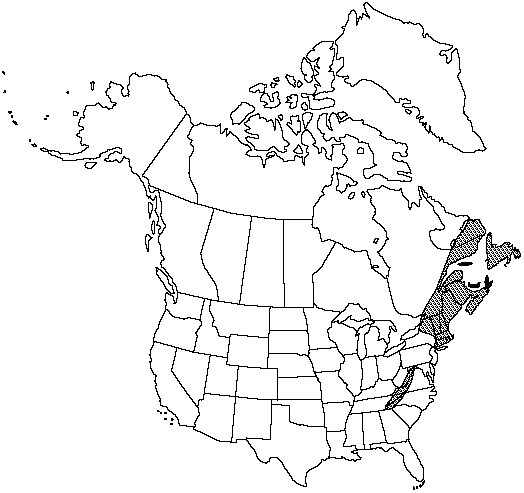Difference between revisions of "Dryopteris campyloptera"
Amer. Fern J. 20: 118. 1930.
FNA>Volume Importer |
GeoffLevin (talk | contribs) m (Fixed Nfld. and Labr. distribution to match printed version.) |
||
| (4 intermediate revisions by 2 users not shown) | |||
| Line 8: | Line 8: | ||
}} | }} | ||
|common_names=Mountain wood fern;eastern spreading wood fern;dryoptère arquée | |common_names=Mountain wood fern;eastern spreading wood fern;dryoptère arquée | ||
| + | |special_status={{Treatment/ID/Special_status | ||
| + | |code=E | ||
| + | |label=Endemic | ||
| + | }} | ||
|basionyms={{Treatment/ID/Basionym | |basionyms={{Treatment/ID/Basionym | ||
|name=Aspidium campylopterum | |name=Aspidium campylopterum | ||
|authority=Kunze | |authority=Kunze | ||
| + | |rank=species | ||
|publication_title=Amer. J. Sci. Arts, ser. | |publication_title=Amer. J. Sci. Arts, ser. | ||
|publication_place=2, 6: 84. 1848 | |publication_place=2, 6: 84. 1848 | ||
| Line 17: | Line 22: | ||
|name=Dryopteris austriaca | |name=Dryopteris austriaca | ||
|authority=(Jacquin) Schinz & Thellung | |authority=(Jacquin) Schinz & Thellung | ||
| + | |rank=species | ||
}} {{Treatment/ID/Synonym | }} {{Treatment/ID/Synonym | ||
|name=Dryopteris spinulosa var. americana | |name=Dryopteris spinulosa var. americana | ||
|authority=(Fischer ex Kunze) Fernald | |authority=(Fischer ex Kunze) Fernald | ||
| + | |rank=variety | ||
}} {{Treatment/ID/Synonym | }} {{Treatment/ID/Synonym | ||
|name=Dryopteris spinulosa var. concordiana | |name=Dryopteris spinulosa var. concordiana | ||
|authority=(Davenport) Eastman | |authority=(Davenport) Eastman | ||
| + | |rank=variety | ||
}} | }} | ||
|hierarchy=Dryopteridaceae;Dryopteris;Dryopteris campyloptera | |hierarchy=Dryopteridaceae;Dryopteris;Dryopteris campyloptera | ||
| Line 36: | Line 44: | ||
|habitat=Cool, moist woods at increasing elevation southward, frequently only at summits of mountains | |habitat=Cool, moist woods at increasing elevation southward, frequently only at summits of mountains | ||
|elevation=0–1500 m | |elevation=0–1500 m | ||
| − | |distribution=N.B.;Nfld.;N.S.;P.E.I.;Que.;Conn.;Maine;Md.;Mass.;N.H.;N.Y.;N.C.;R.I.;Tenn.;Vt.;Va.;W.Va. | + | |distribution=N.B.;Nfld. and Labr.;N.S.;P.E.I.;Que.;Conn.;Maine;Md.;Mass.;N.H.;N.Y.;N.C.;R.I.;Tenn.;Vt.;Va.;W.Va. |
|tables= | |tables= | ||
|references= | |references= | ||
| Line 45: | Line 53: | ||
-->{{#Taxon: | -->{{#Taxon: | ||
name=Dryopteris campyloptera | name=Dryopteris campyloptera | ||
| − | |||
|authority=(Kunze) Clarkson | |authority=(Kunze) Clarkson | ||
|rank=species | |rank=species | ||
| Line 54: | Line 61: | ||
|habitat=Cool, moist woods at increasing elevation southward, frequently only at summits of mountains | |habitat=Cool, moist woods at increasing elevation southward, frequently only at summits of mountains | ||
|elevation=0–1500 m | |elevation=0–1500 m | ||
| − | |distribution=N.B.;Nfld.;N.S.;P.E.I.;Que.;Conn.;Maine;Md.;Mass.;N.H.;N.Y.;N.C.;R.I.;Tenn.;Vt.;Va.;W.Va. | + | |distribution=N.B.;Nfld. and Labr.;N.S.;P.E.I.;Que.;Conn.;Maine;Md.;Mass.;N.H.;N.Y.;N.C.;R.I.;Tenn.;Vt.;Va.;W.Va. |
|reference=None | |reference=None | ||
|publication title=Amer. Fern J. | |publication title=Amer. Fern J. | ||
|publication year=1930 | |publication year=1930 | ||
| − | |special status= | + | |special status=Endemic |
| − | |source xml=https:// | + | |source xml=https://bitbucket.org/aafc-mbb/fna-data-curation/src/2e0870ddd59836b60bcf96646a41e87ea5a5943a/coarse_grained_fna_xml/V2/V2_79.xml |
|genus=Dryopteris | |genus=Dryopteris | ||
|species=Dryopteris campyloptera | |species=Dryopteris campyloptera | ||
Latest revision as of 22:17, 20 February 2024
Leaves monomorphic, dying back in winter, 25–90 × 15–30 cm. Petiole 1/3 length of leaf, scaly at least at base; scales scattered, brown, sometimes with darker patch at base. Blade light green, deltate-ovate, 3-pinnate-pinnatifid, herbaceous, not glandular. Pinnae in plane of blade, lanceolate; basal pinnae deltate to broadly lanceolate, not reduced, basal pinnules equal to adjacent pinnules, basal basiscopic pinnule much longer and 2 times width of basal acroscopic pinnule (only in this species); pinnule margins toothed, teeth spine-tipped. Sori midway between midvein and margin of segments. Indusia usually lacking glands. 2n = 164.
Habitat: Cool, moist woods at increasing elevation southward, frequently only at summits of mountains
Elevation: 0–1500 m
Distribution

N.B., Nfld. and Labr., N.S., P.E.I., Que., Conn., Maine, Md., Mass., N.H., N.Y., N.C., R.I., Tenn., Vt., Va., W.Va.
Discussion
Selected References
None.